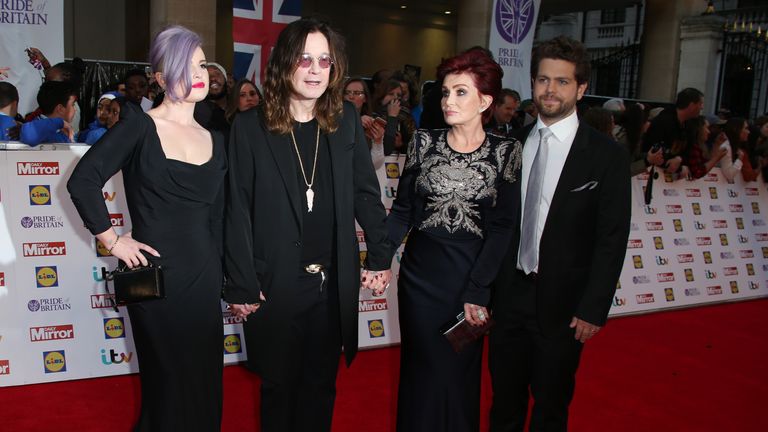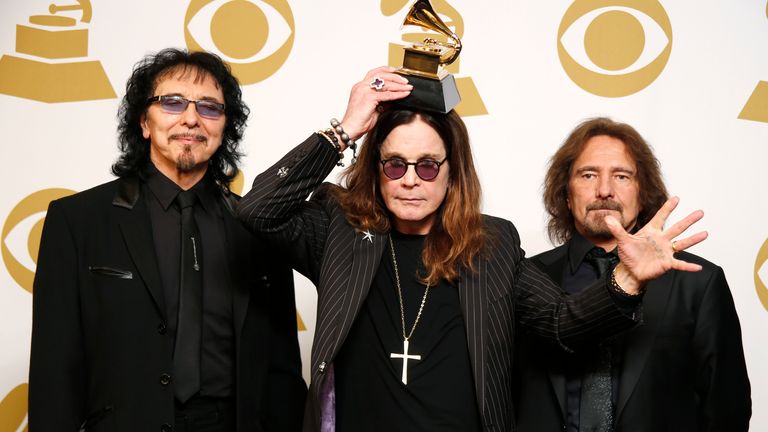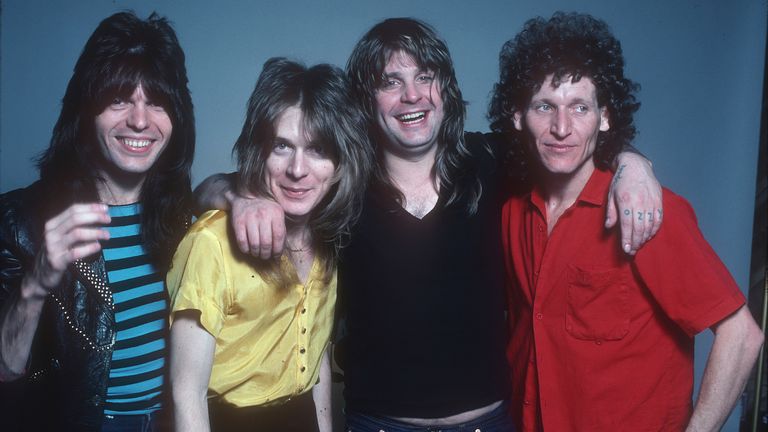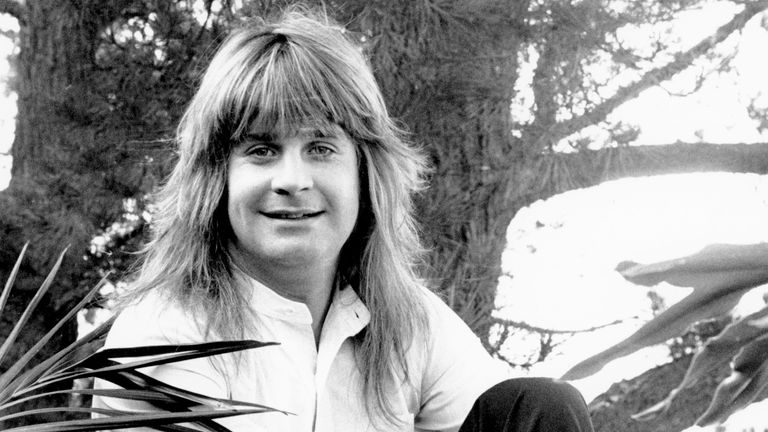Ozzy Osbourne, the iconic voice behind heavy metal’s most defining anthems and one of the genre’s most beloved figures, has died at the age of 76—just weeks after taking the stage one last time in an unforgettable reunion with Black Sabbath. His family confirmed his passing early this morning, stating he was surrounded by loved ones during his final moments.
In a statement shared publicly, his family said:
“We are unable to fully convey the depth of our sorrow as we announce that our dear Ozzy Osbourne has passed away this morning, surrounded by his loving family.”
The announcement has sent shockwaves throughout the music world, particularly because Ozzy’s recent appearance at Villa Park had been such a momentous, celebratory occasion.
Fans had only just seen him back on stage, reclaiming the spotlight in his hometown of Birmingham, England. Though visibly frail and seated on a throne-like chair, his voice rang out with familiar strength and emotion as he delivered a stirring farewell to the crowd.

“You can’t imagine how I feel – thank you from the bottom of my heart,” he said that night, drawing tears from many in attendance. For those who had followed his decades-long career, it felt like a perfect, albeit bittersweet, ending.
A Night to Remember
The Villa Park concert, now remembered as his last public performance, was more than just a reunion—it was a heartfelt tribute to a musical titan. Sharing the stage once again with his Black Sabbath bandmates, the night also featured special performances by some of Ozzy’s favorite acts, including Metallica and Guns N’ Roses. It was a once-in-a-lifetime celebration of heavy metal’s legacy, and Ozzy was its beating heart.
Organizers had billed the show as a “farewell concert,” but few realized just how final the farewell would be. Despite his ongoing health challenges, Ozzy had insisted on performing, telling his wife Sharon that he “needed to say goodbye properly.” That determination is something fans and fellow musicians alike have long admired about him.
Following the news of his passing, Metallica shared a touching black-and-white photo of themselves with Ozzy, accompanied only by a broken heart emoji. It was a simple, raw tribute from one group of legends to another.
A Voice That Changed Music Forever
Born John Michael Osbourne on December 3, 1948, in Birmingham, Ozzy grew up in a working-class household as the fourth of six children. His early life was marked by hardship and rebellion, elements that would later inform his musical style and public persona. Dropping out of school at 15, he bounced between jobs and petty crime before eventually finding his calling in music.

In 1968, he co-founded Black Sabbath with guitarist Tony Iommi, bassist Geezer Butler, and drummer Bill Ward. Together, they helped create the blueprint for heavy metal, releasing albums like Black Sabbath, Paranoid, and Master of Reality—records now considered cornerstones of the genre. Songs like “Iron Man,” “War Pigs,” and “Paranoid” weren’t just hits; they became anthems for generations of outsiders, rebels, and dreamers.
Ozzy’s raw, haunting vocals paired with Sabbath’s doom-laden riffs created a sound that was unlike anything else at the time. Even after being fired from the band in 1979 due to substance abuse issues, he managed to reinvent himself almost immediately with a wildly successful solo career. Hits like “Crazy Train,” “Mr. Crowley,” and “No More Tears” only cemented his status as a singular force in rock music.
Controversy, Myth, and Reality
Ozzy’s life was as dramatic and unpredictable off-stage as it was on. His antics—most infamously biting the head off a bat during a 1982 concert—made him a media sensation and a polarizing figure. While that incident became the stuff of rock-and-roll legend, he later admitted he thought the bat was rubber at the time. Still, it fit the mythos that had built up around him: Ozzy Osbourne, the Prince of Darkness.
His struggles with addiction, arrests, and health issues were well-documented. Yet, he remained remarkably resilient, repeatedly overcoming odds that would have felled lesser artists. Even those who didn’t follow heavy metal knew of Ozzy thanks to the early 2000s MTV reality series The Osbournes. The show provided an unfiltered look into his eccentric home life with his wife Sharon and their children Kelly and Jack. It was raw, chaotic, and surprisingly heartfelt—and it introduced a new generation to a man whose career began decades before they were born.
The Long Road of Illness
Over the past few years, Ozzy had been battling several major health issues. He was diagnosed with Parkinson’s disease in 2003, though he kept it private for many years. In 2019, he suffered a severe fall at home, which aggravated old injuries from a 2003 ATV accident. Multiple surgeries, infections, and hospital stays followed

Despite these setbacks, Ozzy remained determined to keep performing. In 2022, he made a surprise appearance during the closing ceremony of the Commonwealth Games in Birmingham, performing “Paranoid” to a crowd of thousands. It was his first public performance in years, and a powerful reminder of his enduring spirit.
Earlier this year, Sharon announced the Villa Park show as Ozzy’s “final bow.” She said he had been working closely with doctors and physical therapists just to be strong enough for one more night on stage. And he did it.
A Legacy Carved in Stone
Ozzy’s influence on music is incalculable. Over his six-decade career, he earned some of the highest honors in the industry. He was inducted into both the UK Music Hall of Fame and the US Rock & Roll Hall of Fame—once with Black Sabbath and again as a solo artist. He received a Grammy Lifetime Achievement Award, five Grammy wins from twelve nominations, and a star on both the Hollywood Walk of Fame and Birmingham’s Broad Street Walk of Stars.
Additional awards included the Ivor Novello Award for lifetime achievement, NME’s Godlike Genius award, and Classic Rock Magazine’s Living Legend honor. But his greatest legacy may be the millions of fans and musicians he inspired
He helped create a genre, reinvented himself time and again, and remained fiercely loyal to his fans through every high and low. His music has been used in films, video games, sports arenas, and even classrooms—proof of its lasting power across generations.
A Family Man to the End
Despite the dark persona that followed him throughout his career, those close to Ozzy speak of a warm, humorous, and deeply loving man. He often credited Sharon, his wife of over 40 years, for saving his life. Together, they built a family that stayed close even through turbulent times.
He leaves behind Sharon, his children Aimee, Kelly, and Jack, as well as two older children, Jessica and Louis, from his first marriage to Thelma Riley. He was also a proud grandfather, and family members say he relished his role as “Grandpa Ozzy.”

In one of his final interviews, Ozzy said, “I don’t want to be remembered for the crazy stuff. I want people to remember the music. That’s what kept me going.”
And remember him for the music we will.
What does Ozzy Osbourne mean to you? Were you ever lucky enough to see him live—or did his music get you through some tough times? Share your memories and thoughts below.
